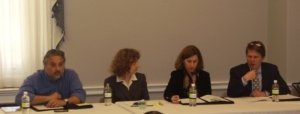On April 4, 2011, the Charity and Security Network and the Muslim Public Affairs Council co-sponsored a Congressional briefing about the role of civil society groups in countering terrorism. Speakers described the multifaceted work of U.S. humanitarian organizations and explained how counterterrorism measures have adversely impacted their work and the people they serve. The event was titled, Civil Society: Confronting Terrorists and Tyrants.
A video of the event will be available soon.
 Lisa Schirch, executive director of the 3D Security Initiative and
Lisa Schirch, executive director of the 3D Security Initiative andprofessor of peacebuilding at Eastern Mennonite University, discussed her work on a comprehensive peace process in Afghanistan and how U.S. undermines its own interests by restricting her ability to urge members of the Taliban to lay down their arms. Having conducted peacebuilding activities in over 20 countries, Schirch has facilitated engagement between conflicting groups through dialogue to build support for the rule of law and a culture of peace. This type of work, however, is hindered by U.S. counterterrorism measures that she describes as “counterproductive” and “confusing.”
Michael German, Policy Counsel at American Civil Liberties Union (ACLU) and former FBI Special Agent in domestic terrorism and covert operations, presented an outline of the Treasury Department’s “discriminatory enforcement” of overbroad U.S. anti-terrorism financing laws on U.S. nonprofits. He described the legal framework that permits the Treasury Department to shut down any organization indefinitely, without notice or hearing, on the basis of secret evidence, and without any meaningful judicial review. German said the assets seized by the government are held without a timeline for release and that Treasury has denied several requests to use that money for humanitarian or disaster relief in accordance with the intent of the donors of these funds. German also discussed the unconstitutionality of Treasury’s authority to freeze a charity’s funds without designating them a terrorist organization. In 2006, a Toledo based charity, KindHearts for Charitable Humanitarian Development, Inc., had its assets seized by the government without a warrant, notice or a hearing. The ACLU challenged the governments’ actions in court and a federal judge found that Treasury had violated the charity’s Fourth and Fifth Amendment Rights.
Azhar Hussain, Vice President for Preventive Diplomacy at the International Center for Religion and Diplomacy (ICRD), spoke about ICRD’s Pakistan Madrasa Project. Run by Hussain, this project held workshops in rural Pakistan for former militants who voluntarily agreed to reject violence and wanted to engage in the peace process. Hussain treated the audience to a short video showing him running the workshops and a testimonial from one of the workshop’s participants who completed the program. Having consulted on education and development initiatives in several countries, including India, Britain, the U.S., and Mexico, Hussain said the U.S. should encourage this types of outreach by U.S. civil society groups. ICRD addresses identity-based conflicts that exceed the reach of traditional diplomacy by incorporating religion as part of the solution.
